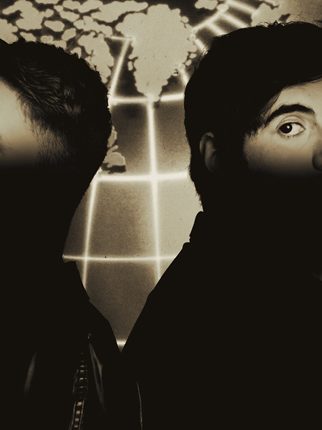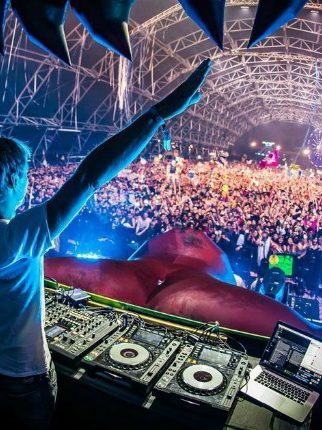After 10 Years Together, Digitalism Is Almost Like a Marriage
Genre-bending and blending dynamos Jens “Jence” Moelle and Ismail “Isi” Tüfekçi—aka Digitalism—are poised to begin their North American tour this Thursday. With their recent Youngblood Hawke collaboration, “Wolves,” plus the upcoming release of their latest track, “Second Chance,” these two are ready to show their stuff.
Before they hit North American soil, we caught up with them in Hamburg, Germany, to talk about the bunker they record in, their now 10-year relationship as a duo, and how excited they are to be coming across the pond once again.
“I think people need to get out and go to their record store and just talk to the guy behind the counter. I’m pretty sure you will find something new. And it will be a great journey.”
I’ve always wanted to ask someone about their WWII bunker. Do you guys still record your music there?
Jence: Yeah! In Hamburg, Germany, where we are from, they built loads of civilian bunkers during World War II. So it’s not like a military bunker, really. It’s next to some really posh, 19th-century houses. It’s probably about six stories tall and has no windows!

I can relate. I have a basement room with no windows in San Francisco.
Jence: Exactly! Except it’s not really underground. It looks like a house, just without the windows. They couldn’t take these bunkers down after the war, so rent is really cheap. It’s not too bad in there, but of course, you don’t know what’s going on outside—especially since the walls are three feet thick or something. We like it, though; it’s really dark in there, and you can get a lot of work done. The only thing you can do in those bunkers is rehearse, or you start to go crazy.
Before you both became bunker dwellers, how did you meet?
Jence: We met in a record shop I was working at. Isi would come in like every afternoon. We just started browsing records together and then, you know, ended up DJing together. And after a while, we couldn’t find the kind of music we wanted to play, so we decided to make it ourselves. Actually, wow—now that I think about it, that was a long time ago!
Like 10 years ago, right?
Jence: Actually, more than 10 years since we first met. But we started doing all this production stuff around 10 years ago.
Isi: Around 2002.
Jence: It’s crazy that it’s been that long already.
You guys hang out a lot outside of making music, right?
Isi: No, we don’t hang out anymore; we got a divorce. No, I’m just kidding. But you know what, it really is like a proper relationship. Imagine you and your girlfriend have been together for 10 years. It’s like that. There are always ups and downs, but that’s normal for relationships. What you learn is to respect each other much, much more, and you know exactly when the other one is upset about something and how to handle it and remain positive. To keep that relationship alive can be hard work.

You guys sound like my parents, so you must be properly married.
Isi: [Laughs] Sort of, yeah.
Jence: I mean, we see each other every day—or almost every day. So, it’s very intense; you have to deal with those problems, otherwise the music would stop.
Let’s switch gears and talk about your music: People used to lump you into genres like blog house and indie dance. Where do you think your sound falls now?
Jence: I think it’s traditional, song-based electronic music, and it has been that way for a long time. I think if we could play instruments, then we would get a few more people and make a band; but we can’t. [Laughs] That’s why everything is electronic, and that’s why you get this sound.
Isi: The good thing about our sound, though, is that you can’t really put us in a genre. We are kind of genre-less.
That’s true, but some fans praise you for blending genres, while others criticize you for it. Is it hard feeling pressure from both the indie rock and electronic sides?
Jence: It’s not really pressure, but I know what you mean. You can’t cater to those specific scenes. We want to remain a bit of a hybrid. We don’t really listen to the outside. We make exactly the kind of music that we want to make. Like, if there is someone who listens to techno all the time and says, “Oh they aren’t really techno!”—then whatever. I never called it techno, so it’s not really our problem.
How about your new stuff? Do you think it is a better representation of what you are going for?
Isi: Yeah, I mean, we released “Wolves” about seven weeks ago. Now we’re releasing “Second Chance.” For us, they are an improvement of our sound and still that mix of modern dance music with that indie touch.
Jence: Those songs are a bit like our last album, I Love You Dude, but a bit updated. They take over where we left off. “Second Chance” especially is a lot more song-based.
What does that song mean to you guys? Is it sort of a “second chance” for you to try that song-based form again yourselves?
Jence: I mean, it’s not about us.
It almost seems relevant. It has been years since you put out a track like that.
Jence: It’s just a really fun song.
Isi: It’s a lot of fun to perform as well. We think it might be the summer jam of the winter. But we also did have guest vocals in a couple other songs.
Jence: It was great to have Youngblood Hawke on “Wolves.” But It has to be the right sound as well.
Speaking of collaborations: What was it like working with Julian Casablancas on the song “Forrest Gump”?
Isi: Personally, not much, because it’s all about the new, modern-generation internet.
Jence: It’s basically email ping-pong, with people nowadays being more on the move. So we didn’t really sit down with Julian, but he sent us a couple of things that we used in the song that we did with him back then. But he was a really nice guy. He was busy, but it was great that he was even able to shoot something over to us. For Youngblood Hawke, they sent us some vocals that just happened to fit perfectly—it actually was brilliant. It came together really well.
Would you guys prefer it to be more personal, like it was in the good old days, or is it kind of fun being in this brave new world of collaboration?
Isi: It’s both. It’s good experience—even if you’re just sitting—able to produce some music, or add a guest track, or producing somebody, or you are using something over the internet. But the personal touch is much more welcome, because you’re spending more time with them. You can talk about stuff besides music. The internet is personal, but on a different level. We aren’t seeing or experiencing each other’s company, and that can actually make a difference.
You guys have said in other interviews that you are inspired by the likes of Daft Punk and Justice; but what else inspires your music?
Jence: It’s mostly traveling and cinematography. When we write songs, we try to inscribe imagery or feeling to it—not like, “I went to the bar and I met this girl, blah blah blah.” Then film composers like Vangelis, Ennio Morricone, John Williams, and you know, all those types. I mean, we grew up with Daft Punk’s first album, but it’s not only that. If anything, those composers have even more influence.
Are you excited about your North American tour? Making any awesome stops along the way?
Jence: We plan on being spontaneous. A lot of the times it’s not possible; we are sitting backstage doing sound checks and stuff. It’s hard to say. But we have done a lot of touristy stuff already, so we really just plan on seeing old friends and trying to catch up. But we haven’t done a US bus tour for like three years, so this is really exciting. It’s going to be a lot of fun.
Want to give any homework assignments to readers? Anyone they need to be listening to?
Isi: There are always cool people coming out. Honestly, I think people need to get out and go to their record store and just talk to the guy behind the counter. I’m pretty sure you will find something new. And it will be a great journey.
Photos by Yoshino
Follow Digitalism on Facebook | Twitter



